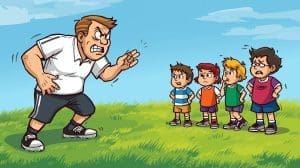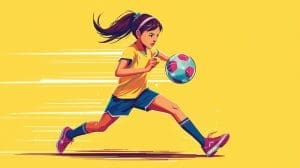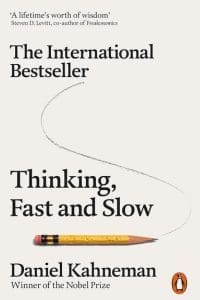
Sports Psychology Tips: 3 Tips to Help You Overcome Setbacks
Do you fail to learn from mistakes?
How many times have you come away from a football or rugby pitch or a golf course and played over and over in your head something that you should have done. When I speak to coaches’ they often think about key decisions they did or did not make in a game. Perhaps a substitution which went wrong. Footballers often remember the great chance they missed or the poor pass they played when on a counterattack that meant a move and a great scoring opportunity broke down. Whereas the golfer might be walking off the course, cursing the fact that they couldn’t get the ball in the hole and missed many “holeable” putts.
This is hugely common, where many people find that those experiences that they want to forget stand out in their memory more than the good ones.
Why is this?
More often than not in a sporting context when we’re dealing with highly motivated, seriously driven athletes and coaches their competitive juices are flowing and emotions can run very high.
Research has shown that bad memories are often more vivid and can be recalled in more detail than good memories which is likely to be linked to the interaction between our emotions and our memories. With studies using neuroimaging and fMRI showing us that the process of encoding and retrieving bad memories involves the parts of the brain that process emotions. As these events have activated the amygdala and the orbitofrontal cortex it highlights why the experience can be so strong for some people.
With the mental context in which the athlete or coach perceives the event shaping how their brain goes on to organise the memories of that event.
As we recall the events, we also consider other events where similar things may have happened. This, in turn affects what can trigger those later memories or how we go on to recall them.
The context around the event can be related to anything that is associated with a memory and often includes sensory cues. Things like the sight of disappointed spectators in the stadium, the sound of dissenting voices from the dugout, strong thoughts such as “how terrible I am” and even the deep seated feelings in your body, perhaps in the pit of your stomach or the tightness in your chest or shoulders. It can often feel like you are reliving “that” moment again and again…
How can you move on and learn from these experiences?
When working with clients to help overcome such bad memories and setbacks I’ve a few tools in my toolkit which I’ll go on to share.
1.Imagery
A tool I often use is “imagery”, where the athlete or coach may sit in a comfortable chair, lie on a bed or is involved more actively standing where we go through the experience in their mind. Often they feel like they are reliving the experience through their senses, it can be very strong for some people so different relaxation exercises and deepeners are required to support this process. In short, we work through a range of exercises, to help the athlete or coach consider what they have learned from the experience and play in their minds time and again how they would change their thoughts, emotions and behaviours if it were to happen again. It’s important to note when doing imagery or visualisation using the senses (visual, auditory, kinaesthetic, olfactory and gustatory) strategically with a professional can be very powerful and a lot more successful in achieving the desired results than trying to go through it in your own mind yourself without a plan.
2.Role play
As a Sports Psychologist I’m sometimes in a position with my clients where we’re involved in deep discussions, sometimes it will be lighter and we’ll have a laugh too when trying to brainstorm ways to overcome challenges. Role-play exercises is another method we sometimes use. Role playing can be very effective to address emotionally difficult topics. Acting out scenarios can help athletes and coaches identify ways in which different people may respond in these types of situations and help us create new approaches to particular events. It can also help the client identify behaviours that may be counter-productive.
3.Reflection
Helping athletes and coaches find ways to become better learners and not repeat mistakes isn’t an easy process. Our personality preferences impact this, as does our support network where we’re often led by how others approach things. It’s also important to remember that as humans we all have default methods that we get comfortable with, so remembering to challenge ourselves and keep an open mind is very helpful.
From my knowledge of Mental Toughness and conversations that I’ve had on the Demystifying Mental Toughness Podcast one thing I’m always mindful is that every individual I come across is very different and that we all sit on a continuum for “learning orientation.” Some people will respond positively to challenges and setbacks knowing that the event provides an opportunity for personal development. They will recognise that this is a normal part of life and will welcome the fact that they may need to change things up, change their routines. All in all they’ll look forward to the challenge and the new experiences that come with this.
Others may worry a little or a lot when something unexpected happens and struggle to see any opportunities in these challenges, not seeing setbacks or failure as part of learning. Then some people will want to walk away, feeling helpless and throw the towel in whereas others will be more patient and determined.
When reflecting it requires honesty and self-critical assessment, it shouldn’t just be paid lip service and seen as a tick box exercise as many athletes and coaches do. It’s something that you may want to consider how you want to walk away from. How do you want to feel after doing some reflective practice. Do you want to feel energised, motivated and confident that you are heading in the right direction?
It’s very easy to make reflection very negative, if it’s approached in the wrong way.
Reflection can help you work out what is under your control. It’s a skill. It isn’t about replaying past mistakes, over and over again and being very hard on yourself as we often default to doing. It’s a process that leave you feeling positive and hopeful if done well.
In my most recent podcast, I discuss this in more detail sharing a model of reflection – Gibbs Reflective Cycle which can help guide you.
You may also want to check out another method which can help you too, this is John Driscoll’s Model of Reflection. The “What, So What, Now What” approach which again can guide you and is a structured process that you can follow.
It’s important to note that there are many ways to reflect, the vital thing is that you choose a method that works for you. Often in sport people fall back on asking the following questions, what did I do well, what could I improve on and how will I make those improvements? This is a helpful way to build confidence and motivation when reviewing performances. It’s certainly a lot better than simply focusing on the negatives. However, Gibbs reflective cycle and Driscoll’s model of refection offer a different take, arguably a more detailed and helpful approach if you’re looking to overcome performance blocks and plateaus and stopping yourself keep on repeating the same mistakes time and again.
If you’re enjoying reading my sports psychology blogs, please do forward them on to other coaches, parents or athletes who would appreciate them or why not sign up to the Mental Edge for regular tips.
You can also join our online community – THE SPORTS PSYCHOLOGY HUB – for regular Sports Psychology tips, podcasts, motivation and support.

Best Wishes
David Charlton
Global Sports Psychologist who is located near Newcastle Upon Tyne, UK and willing to travel Internationally. David also uses online video conferencing software (Zoom, Facetime, WhatsApp) on a regular basis and has clients who he has supported in USA, Canada, South America, UAE, Australian and New Zealand.
Managing Director – Inspiring Sporting Excellence and Founder of The Sports Psychology Hub. With over 10 years experience supporting athletes, coaches, parents and teams to achieve their goals, quickly.







